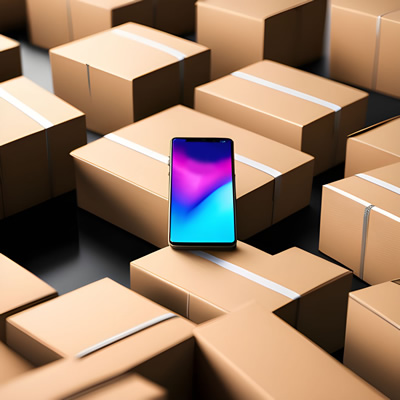The FutureDial Blog
(8.28.2023)

![]() TAKEAWAY: A traded-in mobile phone journeys through a seldom-seen but complex backend ecosystem that brings together diverse stakeholders to streamline the processing, refurbishment, and resale of pre-owned devices in secondary markets. Whether as a refurbisher, reseller, trade-in provider, wireless carrier, or another part of the mobile device reverse logistics supply chain, automation integration drives these entities towards optimized processes, heightened efficiency, and a competitive edge in an ever-changing market. This article is Part 1 of a 9-part series, reviewing the role of Refurbishers and Resellers in the Backend Ecosystem.
TAKEAWAY: A traded-in mobile phone journeys through a seldom-seen but complex backend ecosystem that brings together diverse stakeholders to streamline the processing, refurbishment, and resale of pre-owned devices in secondary markets. Whether as a refurbisher, reseller, trade-in provider, wireless carrier, or another part of the mobile device reverse logistics supply chain, automation integration drives these entities towards optimized processes, heightened efficiency, and a competitive edge in an ever-changing market. This article is Part 1 of a 9-part series, reviewing the role of Refurbishers and Resellers in the Backend Ecosystem.
The Secret Life of Traded-In Phones in the Backend Ecosystem
The swift evolution of personal technology drives a constant influx of new advanced mobile phones to the market. Consequently, many consumers choose to exchange their old phones for newer models, often utilizing trade-in programs. Within the landscape of rejuvenating traded mobile phones, a collaborative ecosystem thrives.
Ever wondered about your old phone post-trade-in? Let’s explore the backend ecosystem that processes, refurbishes, and resells pre-owned mobile phones globally. Consider the unseen journey your aging phone undertakes, finding new purpose with its next owner.
Given this vast industry, we’ll discuss each sector in separate articles. In this Part 1, we’ll focus on Refurbishers & Resellers.
PART 1: Refurbishers & Resellers ― Enhancing Devices for Secondary Markets
![]() The refurbisher/reseller sector serves a vital role in the secondary mobile device market by enhancing pre-owned phones for resale. These companies acquire used devices, enhance their condition through repairs and cosmetic touch-ups, and add value to them. This practice not only contributes to sustainability by extending the lifespan of these devices, but also offers a smooth experience for both buyers and sellers.
The refurbisher/reseller sector serves a vital role in the secondary mobile device market by enhancing pre-owned phones for resale. These companies acquire used devices, enhance their condition through repairs and cosmetic touch-ups, and add value to them. This practice not only contributes to sustainability by extending the lifespan of these devices, but also offers a smooth experience for both buyers and sellers.
Refurbishers encounter a variety of device conditions upon acquisition and diligently assess and grade each device for functionality and appearance. Devices in near-perfect condition become a “seed stock” foundation for warranty replacements. To maintain consistent quality across multiple third-party logistics providers (3PLs), these trefurbishers and resellers may leverage various forms of automation in the device processing operations.
Key characteristics of their business include:
1. Device Procurement: They obtain pre-tested/graded devices from auctions and resell them for profit. Purchase decisions are influenced by resale demand.
2. Device Processing: The level of processing varies. Some simply receive and drop-ship devices, while others conduct basic testing, data clearing, and even value-added services like cleaning or light repairs.
3. Selling Approach: The approach to selling devices varies by model and region. They might sell in bulk or directly to individuals online.
![]() 4. Utilization of Intelligent Data: Smart data plays a pivotal role in their operations, facilitating accurate device identification during collection and customer engagements. Insights from data steer device routing to enhance resale outcomes. While current practices involve manual decisions influenced by sales demand, the potential for more automated solutions is considerable, especially if they incorporate various data sources. Core business elements encompass sourcing pre-tested devices via auctions aligned with resale demand, presenting a range of device processing options from drop-shipping to value-added services, and adopting adaptable selling strategies based on specific models and regions. At the heart of it all, intelligent data assumes a central role by enabling precise device identification and guiding optimal routing decisions for resale success.
4. Utilization of Intelligent Data: Smart data plays a pivotal role in their operations, facilitating accurate device identification during collection and customer engagements. Insights from data steer device routing to enhance resale outcomes. While current practices involve manual decisions influenced by sales demand, the potential for more automated solutions is considerable, especially if they incorporate various data sources. Core business elements encompass sourcing pre-tested devices via auctions aligned with resale demand, presenting a range of device processing options from drop-shipping to value-added services, and adopting adaptable selling strategies based on specific models and regions. At the heart of it all, intelligent data assumes a central role by enabling precise device identification and guiding optimal routing decisions for resale success.
5. Challenges: Ensuring accuracy in upstream assessments remains an ongoing challenge. Devices graded A might sometimes have a portion that’s of lower quality, impacting customer satisfaction.
6. Innovation and Automation: While these companies prioritize strategic buying and selling, they may not be at the forefront of innovation due to controlled collections, high margins per device, and limited competition. However, automation in upstream processes could affect their sourcing decisions. Despite persistent challenges in assessment precision, innovation and automation take a back seat due to controlled collections and high margins.
7. Receiving Process Streamlining: Efficiency isn’t a top priority for their receiving process. They focus on receiving the exact number of devices purchased without adding complexity. Interest in streamlining the receiving process remains subdued, prioritizing accurate device counts.
8. Embracing Change: Their interest in change is linked to resale demand. As customer engagement methods and technology evolve, embracing change becomes important. Warehouse management systems could continue to be relevant for consistency across 3PLs and flexibility with carriers. However, embracing change aligns with evolving customer engagement methods and technological trends.
Refurbishers Utilizing Processing Automation for Enhanced Productivity & Profit
Automation presents a transformative opportunity for the refurbisher industry. Strategic deployment of automation systems not only holds the potential to revolutionize operations but also promises to elevate accuracy, accelerate processes, and mitigate the risks associated with human error. By seamlessly incorporating automated procedures into device testing and grading, refurbishers can enhance their precision, expedite workflows, and ensure consistent outcomes.
Automated systems exhibit a remarkable ability to discern device conditions with utmost precision, ensuring accurate assessments and reliable categorizations. This pivotal advancement streamlines the entire refurbishment journey, enabling data-driven decisions for both procurement and resale strategies. Additionally, automation serves as a guiding force in optimizing device routing, ensuring that each device finds its optimal resale destination with precision.
The embrace of automation marks a pivotal leap forward for refurbishers, bolstering quality control, operational efficiency, and customer satisfaction. With a meticulous approach, refurbishers meticulously evaluate and grade devices sourced under various conditions, strategically utilizing those in near-perfect condition as cornerstones for warranty replacements. This commitment to consistency and excellence permeates across multiple processing lines within the refurbishers’ warehouses and processing centers.
Refurbishers and resellers play a crucial role in extending the lifespan of traded phones, fostering sustainability, and crafting seamless experiences for both buyers and sellers alike. Through their diligent evaluation, enhancement, and transformation efforts, these entities ensure that pre-owned devices transition into the hands of new owners in impeccable condition, embodying their commitment to both quality and environmental responsibility..
The Multi-Player Ecosystem of Refurbishing and Renewing Traded Phones
 The journey of a traded-in mobile phone involves a complex back-end ecosystem where multiple players come together to process, refurbish, and resell pre-owned devices on secondary markets. From refurbishers and 3PLs driving efficiency through intelligent data to trade-in providers striking a balance between attractive offers and profitability, each entity plays a critical role in ensuring a seamless and profitable process for all involved parties. So, the next time you trade in your old phone, remember that it embarks on an intriguing journey to find a new life in the hands of its next owner.
The journey of a traded-in mobile phone involves a complex back-end ecosystem where multiple players come together to process, refurbish, and resell pre-owned devices on secondary markets. From refurbishers and 3PLs driving efficiency through intelligent data to trade-in providers striking a balance between attractive offers and profitability, each entity plays a critical role in ensuring a seamless and profitable process for all involved parties. So, the next time you trade in your old phone, remember that it embarks on an intriguing journey to find a new life in the hands of its next owner.
Profit-Boosting Solutions for the Mobile Supply Chain
All of these players in the ecosystem of refurbishing and renewing traded phones partner with FutureDial for automation and data management solutions that enhance their business operations and increase their profitability. Whether you are a refurbisher, reseller, trade-in provider, wireless carrier, or any other part of the reverse logistics mobile supply chain, FutureDial’s technology can elevate your processes, boost efficiency, and ultimately help your business increase profitability and stay ahead in this competitive market. Contact FutureDial at sales@futuredial.com
Coming Up:
Don’t miss PART 2 of our Backend Ecosystem Review, describing the roles of the Third-Party Logistics Providers (3PLs) and Third-Party Processors.
© 2023 FutureDial Incorporated. All Rights Reserved.

